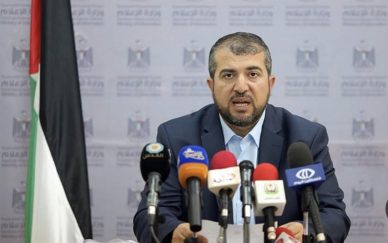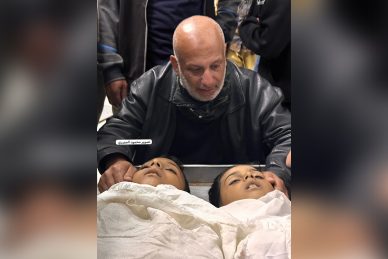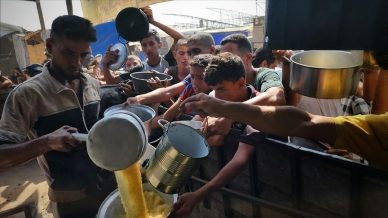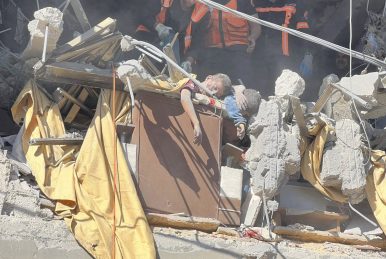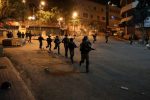GAZA, (PIC)
As the ceasefire in the Gaza Strip takes effect, the wounds of mothers are reopened, confronting the anguished reality of their children’s absence. Some mothers have lost one or two sons, while others have awakened to find themselves without a family, as the occupying army exterminated all their children in a single raid, including Ghada Dawla.
Ghada, 49, fled from northern Wadi Gaza to the south. On the night of October 13, 2023, at ten o’clock, a violent explosion rang out. Her father, brothers, and children went out to check the area, but they never returned. Three Israeli shells tore them apart, leaving her in a bottomless abyss.
She says, “My son Ahmed was martyred from shrapnel to his head; the doctors couldn’t treat him as they lacked the means. The moment of farewell was a nightmare. I embraced Ahmed tightly, then fainted repeatedly.” As for Amir, he suffered severe injuries and was transferred to Nasser Hospital, and I could only bid him farewell in the cemetery.
If only I hadn’t fled!
The pain was unbearable when the return of northern residents was announced. “I wanted to take my children’s graves with me, but my brother convinced me to leave them where they are, as if I were leaving a part of myself behind forever. We returned walking along Al-Rasheed Street; the journey was long, and I cried all the way. How could I return without my children?” the grieving mother asks herself.
Dawla blames herself and speaks to herself, “If I hadn’t fled, would they have stayed by my side? A deadly feeling of guilt haunts me; as a mother, I should have protected them. I live in an unending whirlwind, seeing them in front of me even while awake, talking to them, reaching out to hug them, as if I am losing my mind.”
Despite all this pain, the mother finds no room for prolonged sorrow, as she has lost her home, and there are no means of living in northern Gaza Strip. She must care for her remaining children and fulfill all the responsibilities required of her under the most difficult physical and psychological conditions.
Every mother in the Gaza Strip carries two wounds in her heart: the wound of constant fear for those remaining, and the wound of separation imposed by war, placing them under the weight of compounded challenges, where their psychological and emotional needs are neglected in a community ravaged by destruction, and many are deprived of the support they need in these harshest moments of their lives.
A heavy psychological burden
The report from the Palestinian Center for Human Rights says that mothers in the Gaza Strip bear a heavy psychological burden. A mother does not only grieve for the loss of her son but is forced to adapt to a bitter reality where there is no safe place for mourning or recovery.
The report titled “The Crime of Genocide Continues in the Hearts of Mothers” reveals that the tragedy lies in the fact that these women, who have lost their children, find no support during this profound stage of loss, which exacerbates their suffering and makes it more severe.
It explains that mothers, despite their loss and psychological collapse, are compelled to continue performing their household responsibilities, raising and caring for children amidst harsh conditions lacking basic life necessities such as clean water, electricity, privacy, and safety.
The human rights report highlights the greater tragedy faced by most mothers living in crowded tents and shelters that lack the most basic life requirements, turning every day into a struggle for survival, where sorrow mingles with oppression and unending responsibility.
The birth of new deaths
Fatima Al-Sarsak, 25, lives this tragedy in all its details, like 1.9 million Palestinians who have been displaced to central and southern Gaza Strip. However, this hell is not absent from her memory; she has been living it since the night of October 30, 2023, when an Israeli missile annihilated her family.
She recounts, “I found myself in an empty land, while my daughter Ayloul lay outside the house. My husband and my four children were under the rubble.”
Al-Sarsak adds, “She was a burnt body without features; I couldn’t even look at her from the horror of what had happened. The burns were third-degree, and the wound on her head required seven stitches. I knew she was in pain, but I couldn’t hold her; I couldn’t even stand.”
Al-Sarsak lost three children: Iyad (8 years), Tamer (6 years), who were completely burned, and Salma (5 years), whose foot was dangling from her thin skin. They could only be retrieved the next day, and she couldn’t bid them farewell. “I couldn’t bear to have their burnt image be the last memory I held of them. They were buried far from me; I wished they weren’t burned so I could say goodbye.”
When the ceasefire was announced and Al-Sarsak returned to the Gaza Strip, “I didn’t rejoice at my return; there was a new death being born inside me with every step. I returned alone without my children, my heart aching. I didn’t rejoice at the ceasefire, for my pain renewed, as the war stole from me the dearest things I had. I find myself crying all night, unable to forget or ignore the events that changed my life.”
Al-Sarsak is overwhelmed by a huge sense of guilt she cannot control; how could she not protect her children! She finds herself living in a vast, meaningless void. “I used to care for them and meet their needs; now they exist only in my heart, which has not healed from the pain of loss. I am a woman who lost three children at once, and I still live the pain every day. I need psychological support, but where is the refuge in a homeland that has become nothing but destruction?”
Loss of existential identity
The report from the human rights center emphasizes the uniqueness of Palestinian society, where mothers are entrusted with the primary responsibility for raising children and meeting their daily needs, forming a close relationship rooted in care and attention to every detail of their lives.
It says, “When a mother loses her son, she loses an essential part of her daily identity tied to this role, making the pain transcend normal grief to become a feeling of existential emptiness.”
It points out that mothers’ loss of their children leads them to feel they have failed in their role of protecting them, even when it is beyond their control. It stresses that “this feeling of personal failure intertwines with normal grief, creating a deeper psychological harm that cannot be erased.”
The report notes that the bond between a mother and her child begins from the first moment of pregnancy, forming a deep emotional and physical connection that distinguishes this relationship from any other, making the loss of this bond more than just the loss of an individual; it is the uprooting of an existence.
Deep traumas and chronic disorders
The loss of children due to wars is one of the deep psychological traumas faced by mothers, as this loss causes radical changes in their psychological and emotional structures, affecting daily life and mental health in the long term. According to attachment theory established by psychologist John Bowlby.
Bowlby explains that the relationship between a mother and her child is considered a source of emotional security and stability; thus, losing this bond constitutes a trauma that may lead to disorders such as depression, anxiety, and post-traumatic stress disorder (PTSD), noting that the loss of this primary attachment leaves a profound impact that requires a long time to heal.
From a social psychology perspective, Dr. Marianne Wheeler, a professor of social psychology at Columbia University, argues that a mother’s loss of her child in wartime affects not only the emotional side but extends to social impacts and the identity of the mother.
In a study published in the “International Journal of Social Psychology,” Wheeler notes that mothers who have lost their children may experience social isolation and a lack of community support, increasing the likelihood of developing chronic psychological disorders.
She adds that feelings of guilt and self-rejection may hinder the recovery process, necessitating the provision of a supportive environment that makes mothers feel part of a social network offering psychological and emotional support.
Social and economic impact
Based on a report from the International Mental Health Organization, early therapeutic interventions, such as individual and group therapy, play a crucial role in reducing the severity of psychological disorders among affected mothers resulting from PTSD.
It shows that the loss of children complicates their psychological state, as mothers lose the primary source of emotional support and security provided by maternal attachment. The report illustrates how the loss of a child affects maternal identity, leading to a persistent feeling of sadness and isolation.
The report emphasizes that the psychological traumas resulting from wars are not limited to the individual level but extend to impact the social and economic environment of mothers. Often, this group suffers from a break in social support networks, whether from family or the local community, making the recovery process more challenging.
It also notes that the deteriorating economic conditions in conflict areas exacerbate psychological disorders, as mothers lack the necessary resources to access treatment and ongoing support.


